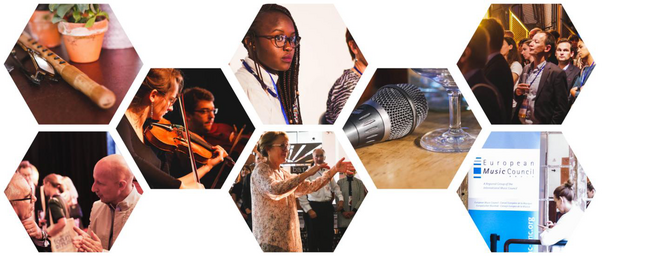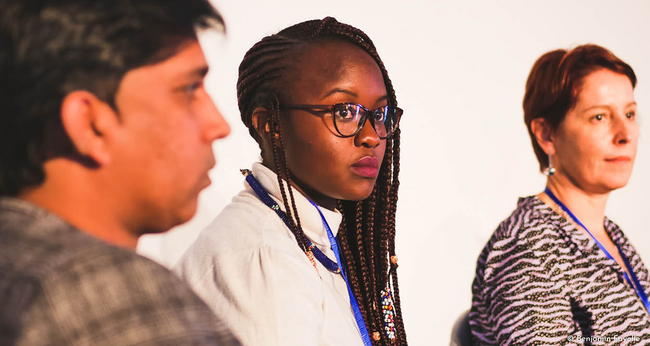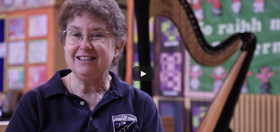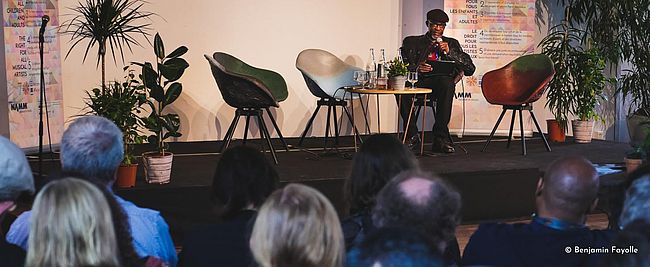
|
|
|
|
|
| |
|
The right for all children and adults ...
|
| |
|
|
|
| |

|
|
... to have access to musical involvement through participation, listening, creation, and information
| The session on the Third Music Right opened the World Forum on Music in Paris on Sunday 29th September. It was curated by Allin Gray, a Board Member of the European Orchestra Federation and outgoing Board Member of the International Music Council. |
| |
Discover our third newsletter on the 6th World Forum on Music organised last September in Paris, France.
More to follow! |
| |
|
|
|
|
|
"Music saved my life and music saved my soul"
|
| |
|
|
|
| |
| A keynote speech from Arn Chorn-Pond, the founder of Cambodia Living Arts and IMC Music Rights Champion, opened the session. Born into a family of artists, Arn Chorn-Pond grew up in Cambodia during the Khmer Rouge regime. Sent to a child labor camp and forced to play propaganda music during that period, he was later adopted by Reverend Peter Pond and moved to Vermont. After attending Brown University and graduating from Providence College, he returned to Cambodia on a mission to find the legacy of his family who were involved in Cambodian Opera, his music teacher from the time of the Khmer Rouge, and the stars of his early childhood. On this trip, the Cambodian Masters Performers Project, now Cambodian Living Arts, was born. |
| |
|
|
|
|
|
|
|
|
| |
|
|
|
| For a decade, Cambodian Living Arts focused on endangered performing art forms and rituals. As 90% of Cambodia’s artists did not survive the Khmer Rouge regime, Cambodia’s artistic heritage was in danger of being lost forever. Over the last 20 years, both Cambodia and the arts scene have developed rapidly. The foundation has focused on helping talented people to build and develop careers in the arts, through scholarships, fellowships, and support to troupes and individuals. |
| |
| Arn now lives outside of Phnom Penh and continues to work part-time on projects for Cambodian Living Arts. You can also read about Arn’s journey in Never Fall Down, a novel by Patricia McCormick, based closely on Arn’s experiences. You can also see a 15 minute talk at TEDx here or watch his Music Rights Champion nomination speech here: |
| |
| | | | | | |
| |
|
|
|
|
|
|
| |
| Arn’s keynote was followed by an interview on advocacy with Mary Luehrsen, director of public affairs and government relations for the National Association for Music Merchants (NAMM) and Executive Director of the NAMM Foundation. Mary talked about the importance, not just of caring, but of caring effectively; deciding on our aims in helping other people, in making change and in putting our aims into actions. Most importantly, what we must do if we want to make change, is to give time every week, every month to our advocacy. It doesn’t have to be much time but we must keep with it and be relentlessly positive. |
| |
| | | | | | |
| |
|
|
|
|
|
|
|
|
|
|
| |

|
|
| A panel discussion followed with panellists from four continents talking of aspects of access to music education in their countries and what access to music can give to people in different situations. The panel was moderated by Sonja Greiner, Secretary General of European Choral Association - Europa Cantat and included participation from Arthur Gill of Teaching Music in Pakistan (IMC Music Rights Laureate in 2017), María Claudia Parias, Executive president of Batuta National Foundation - Fundación Nacional Batuta Colombia, Mariam Obange, a music undergraduate student in Nairobi and former student of the National Youth Talent Academy Kenya and Carl Jones, a 16-year old participant in the Scoil Úna Naofa Violin & Orchestra Project, 2019 laureate of the IMC Music Rights Award. |
| |
| Sonja Greiner pointed out how difficult it was to have such a panel directly after the brilliant and extremely touching keynote speech by Arn Chorn-Pond. While he could claim that music had literally saved his life, most people would consider that access to music was important for them at another level. Nevertheless, Arn also talked about how music saved his soul once he was adopted and safe in the USA, and that was a feeling many people would share. The very diverse panel then gave insights into how access to music could be a right denied due to a number of different reasons such as the habit of singing in the family or accompanying traditional rites with music decreasing in many countries, music often only being available with the help of privately funded projects even in Europe, or people with disabilities having difficulties to access venues or to profit from music education. The panel thus also made it clear that the right to musical involvement is closely connected to the right to learning music. |
| |
| |
| |
|
|
|
|
| |
|
|
| |

|
|
Fundación Nacional Batuta Colombia
| Get a glimpse of what effects the work of music programmes has for socially disvantaged children. The foundation wants to improve children's lives by providing them with music lessons. |
| |
| | | | | | |
| |
|
|
|
|
|
|
| |

|
|
Get to know St. Agnes Crumlin Orchestra
| The St. Agnes Crumlin Orchestra is an orchestra formed of 100 members ranging all age. This project is laureate of the IMC Music Rights Awards 2019. |
| |
| | | | | | |
| |
|
|
|
|
|
|
|
|
|
|
Documenting Music for Next Generations
|
| |
|
|
|
| |

|
|
| Another IMC Music Rights Champion, Tabu Osusa from Kenya, presented his work to preserve and promote traditional and popular music in East Africa through Ketebul Music. He shared his inspiring projects such as Singing Wells, whose name derives from a remarkable Kenyan tradition which epitomises the importance and power of music within the country. |
| |
| During the dry season, as the sun rises, young boys from the Samburu tribe begin to gather around deep wells which are dug into the parched river bed. As they begin to pull water from these wells, they start singing – from each well comes a different, simple song. As the songs begin, small herds of cows and goats appear from out of the bushes, climbing over the river bank and down to the river bed. Each herd recognises the song of ‘their well’ and makes their way towards it to drink. |
| |
| Soon thousands of animals fill the river bed, called by the crystal clear song of their master. After each animal has drunk its fill, the herds begin to climb back out of the river bed, led by more small boys. The singers climb out of their wells and disappear into the day. |
| |
| This extraordinary event has been going on for at least five generations. |
| |
| | | | | | |
| |
| |
| |
| |
| |
|
|
|
|
|
The IMC and EMC teams wish you a peaceful holiday season!
|
| |
|
|
|
|
|
|
You have received this newsletter because you subscribed to the Music World News and/or the EMC newsletter.
|
| |
|
|
|
|
|
|
|
| |
|
| |
You have received this newsletter because your are on the mailing list of the International Music Council. If you no longer wish to receive any emails from the International Music Council, please reply to this email writing "unsubscribe newsletter" in the subject line.
|
|
|
|